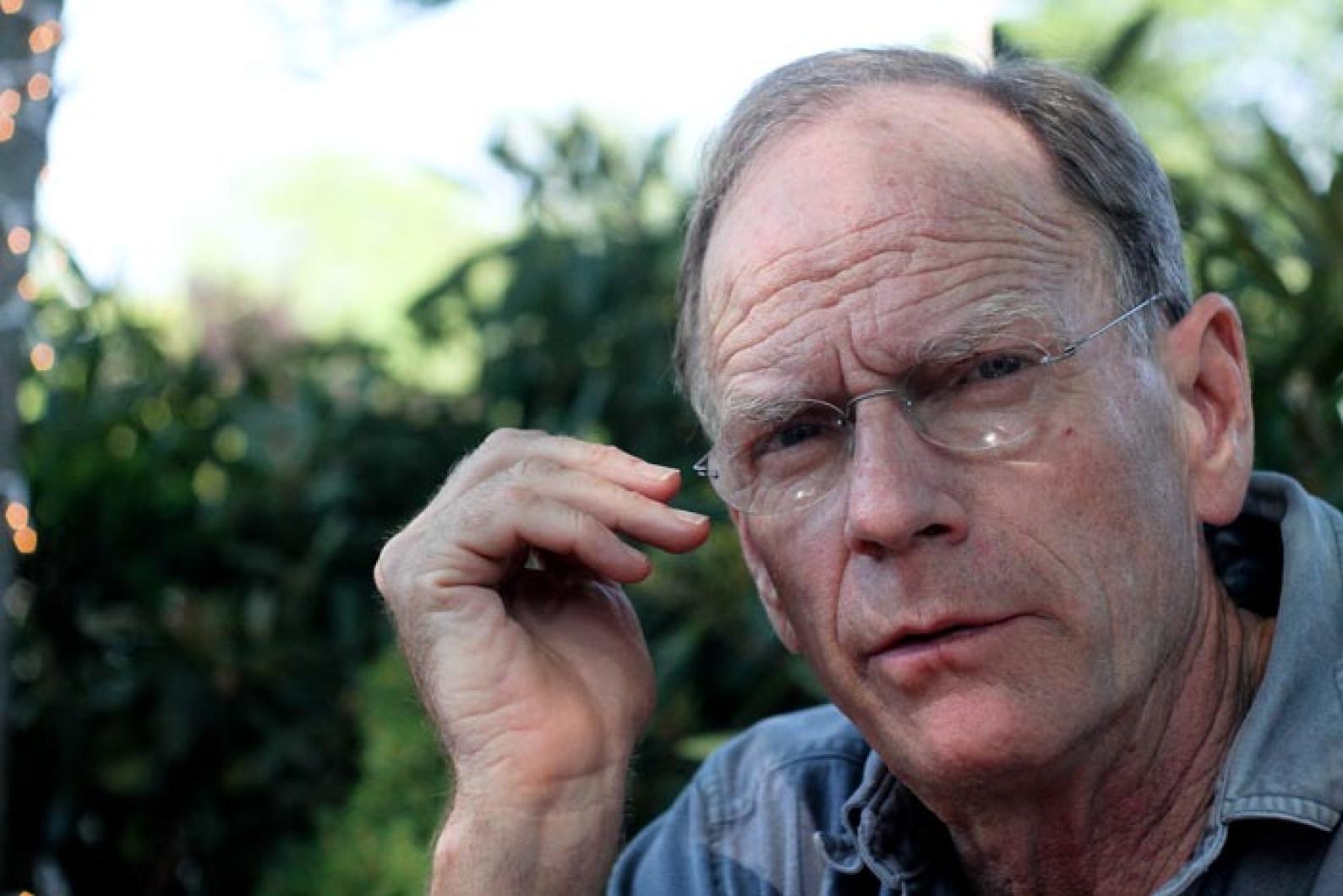The audience is the boss. Performance is a seduction. Never give up something for nothing. Livingston Taylor eagerly passes along all this and more to his students at the Berklee College of Music, and now to readers who pick up a copy of the new edition of his book, Stage Performance.
Mr. Taylor was asked to lecture in the mid-1980s at Berklee and was subsequently asked to teach a course on stage performance. “I was on that like a tick on a dog,” he said in an interview at Espresso Love in Edgartown this week. “I’ve always loved teaching and, if I may say, I’m a good teacher.”
Full of energy and ideas, Mr. Taylor, who performs tonight and tomorrow night at the Old Whaling Church in Edgartown, would be a fascinating presence in front of the proverbial blackboard. Drawing on his experiences throughout his 40 years of playing for audiences, he is eager to pass on what he’s learned.
“The greatest detriment to a career is good looks and talent,” Mr. Taylor said. “Ultimately, why people pay you is because you came to them, not that they came to you . . . and the difficulty with being beautiful and talented is people come to you. So, you get on stage [and] people are there and they’re at you and it becomes terribly unsettling.” He points out that his best students are often those who are not classically good-looking.
For Mr. Taylor, the most important thing is communicating with the audience. Throughout the book, which is laid out like a semester of his course, complete with students, he encourages performers to use all their senses to understand their audience. In the book, Mr. Taylor uses other musicians as an example. Take Jimmy Buffett, for example. “He’s having that conversation with his audience — all the time. A give and take. He sees them, and he knows that his success is dependent on their freely given goodwill,” Mr. Taylor writes.
This idea of having a conversation with the audience, rather than simply talking at them, leads to another Livingston Taylor tenet. The audience is the boss. Throughout the book, he writes that the audience pays his salary. If he doesn’t have a strong base, he has no career. Mr. Taylor outlines the performer’s need for an audience by drawing a distinction between what he calls the vertical integration of a family, a group of people predisposed to like you, and the horizontal integration of a peer group, a group of people you have to win over. “You need them, they don’t need you,” he said. “How do we make an audience safe? How do we get them safe enough so they can incorporate our vision and then enthusiastic enough to keep financing our vision so we can make a living?”
But sometimes the audience just isn’t on your side, and in the book Mr. Taylor gives advice on how to handle hecklers. “Sometimes you’ll get very crazy people,” he writes. “Generally it’s a combination of them being chemically altered and probably manic and they just have no capacity for absorption of credible human intercourse. That’s tough to deal with.” Sometimes Mr. Taylor comes down from the stage to talk to a heckler. “Make no mistake, if I come off that stage and I’m looking at you like this [he pulls an angry face] it’s not good news,” he said.
Mr. Taylor also writes about the business side of entertainment. “You don’t perform if you don’t make a living,” he said. In the book, he tackles one of the major questions facing performers: Is making money more important than my art? He writes of one of his students recognizing his voice in the jingle of a Little Debbie Snack Cakes commercial. The student thinks Mr. Taylor has sold out. Mr. Taylor writes, “I used to think it would be wonderful to make a living doing only the things I wanted to do. But I discovered a pleasant reality while doing the things I had to do. It’s the things we have to do that take us to magical places.”
This question of making a living leads Mr. Taylor to a discussion of the changing landscape in the music industry brought about by the Internet. “Gatekeepers are essential in the development of art,” he said, a view that contrasts with those who argue that the Internet democratizes access to art and makes it easier for performers to reach their audience. “What gatekeepers do is they make you good,” he said, noting that editors, for example, help refine a writer’s work. “Great art is the result of wealth concentrating talent,” he said, using the Sistine Chapel as an example. In Mr. Taylor’s view, gatekeepers support competition, which also helps refine an artist’s work.
At the same time, his book is self-published through the Internet, though it doesn’t look it. It’s an example of another one of Mr. Taylor’s tenets: Never give up something for nothing. The publishing deal available to him appeared to take more than it would return — so he struck out on his own. In the book, writing about musicians signing management deals, he strongly advises against simply taking a deal out of fear that nothing else will come along. Mr. Taylor has also put out his own records, though he distributes them through a company.
Another thing performers must face is that careers have peaks and valleys. Mr. Taylor experienced one such valley in the 1970s when he found himself playing in dive bars that he felt were beneath his ability. “One of the great gifts of getting older is that your gratitude quotient increases dramatically,” he said. Mr. Taylor comes from a musical family, his brothers James and Hugh and his sister Kate are all musicians, as are his niece Sally and his nephew Ben. Does Mr. Taylor bring up the performance techniques he teaches in the classroom with his family? “I tend to be a little more instructive and, shall I say, slightly more bombastic with my nieces and nephews,” he said.
Mr. Taylor will bring his considerable stage experience to the Old Whaling Church in Edgartown for his annual summer concert this weekend.
“I’ve probably been doing a concert on Martha’s Vineyard in the summer for probably the last 35 years. I can’t remember a time when I didn’t,” he said.
He performed at the Tabernacle in Oak Bluffs for the last few years, but found that he missed the Old Whaling Church and wanted to give it another shot. “I am not an artist. I am a craftsperson, I have developed a skill-set.”
This Friday and Saturday, Mr. Taylor will show off his considerable skills.
Doors open at 7:30 p.m. tonight and tomorrow night for the Livingston Taylor concert at the Old Whaling Church. The concert begins at 8 p.m. Tickts are $40 for premium seats with a meet and greet, and $20 for general seating.







Comments
Comment policy »